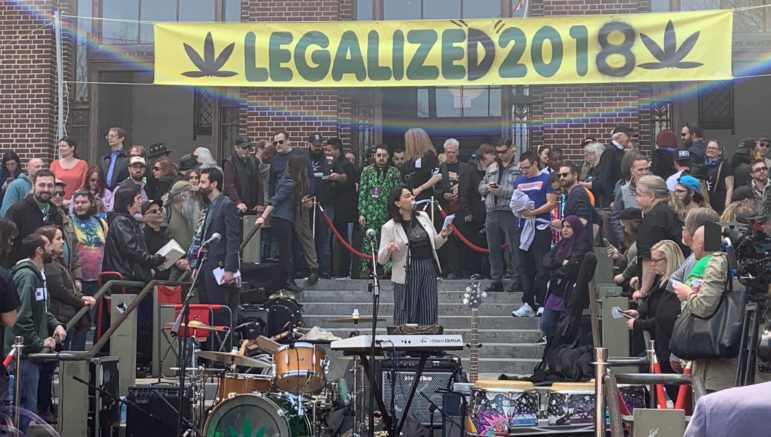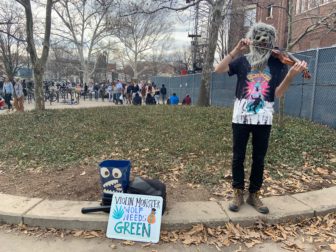
Kayla Effner
National Cannabis Industry Association Business Development Manager Clarissa Krieck, who joined the cannabis movement in 2011, gave a speech on the main Hash Bash stage. Behind her, the spray-painted banner from last year’s Hash Bash recognizes Michigan’s new marijuana laws.
The 48th annual Hash Bash took place in Ann Arbor on April 6th. This year, the event took on a new tone in recognition of Michigan legalizing marijuana in November.
For most of its existence, Hash Bash has served as a call for legalization. Briefly, it was a celebration of freedom after a Supreme Court decision in 1972 temporarily left the state without any marijuana regulations.
Thousands gathered at the University of Michigan’s Diag to rally, celebrate and exchange cannabis products.
An array of speakers including officials, activists and marijuana experts took to the stage to promote the benefits of passing Proposition 1.

Kayla Effner
On the outskirts of the diag, this “Violin Monster” plays for Hash Bash attendees every year. He may look a little scary, but his sound and message promote peace.
“The weed has been freed,” said Gus Rosania, a professor at the University of Michigan. Rosania teaches the first cannabis class at the University of Michigan.
U.S. Rep. Debbie Dingell, who said she has never tried marijuana in her life, spoke on behalf of its medicinal uses. Although she said her father’s history of addiction has turned her off from all drugs, she supported the idea of her late husband,Congressman John Dingell, using medical marijuana to treat prostate cancer.
“You know, John Dingell was in a lot of pain. I miss him. He’s up there. He probably can’t believe I’m here today,” she said. “I wanted him to try it because he was in so much pain and he was afraid of it. You know, right now, because marijuana is scheduled as a Class 1 drug, we’re not doing the research we need.”
Other speakers, including Ann Arbor State Representative Yousef Rabhi, also stressed the need for government research and reform.
Throughout college, Rabhi worked as an activist in peace, labor and environmental movements. He is now calling for justice on behalf of citizens with criminal charges due to marijuana and other nonviolent offenses.
“Our brothers and sisters are in prison for crimes they didn’t commit … we are wronging the people of this state,” he said.